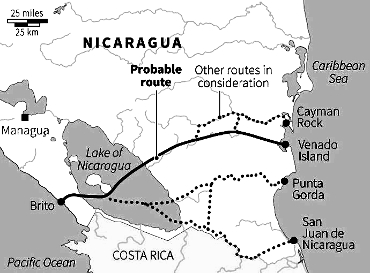Incredible ocean link plan brings unknown risk
 Progress appears to have been made on a $40 billion project to open a new link between the Atlantic and Pacific Oceans.
Progress appears to have been made on a $40 billion project to open a new link between the Atlantic and Pacific Oceans.
A mysterious Chinese company has secured the rights to an incredible engineering project – carving a canal across the entire width of Nicaragua.
The project has been the dream of investors and empire-builders for generations, but now seems to be taking shape.
Reports say a firm called Hong Kong Nicaragua Development Group (HKND) has managed to snare exclusive rights to the construction of the canal across the Central American nation, which will provide a new water bridge to link global powers.
The mind-bogglingly vast dig will run across nearly 300 kilometres of Nicaraguan soil, and see the construction of seaports, an airport, free-trade zones and freight rail to support its huge logistical capacity.
But the project so far has been mired in controversy and powerful opposition.
Safety issues have been raised for everyone including the cut-price workers, farmers and other Nicaraguan residents displaced with little reimbursal, and for the environment itself.
The plan to outdo the nearby Panama Canal has massive potential to destroy the lives of locals and their ecosystems, and experts say rights will be pushed aside for progress.
It is still unclear just who is responsible for the incredible $40 billion in capital required for the Nicaraguan canal, with some insiders speculating that the Chinese government has put up the money through HKND.
Many have questioned the true nature of the company, which has no experience in infrastructure development, was only recently formed and is headed by a telecommunications executive.
HKND claims that the project is fully privately-funded, but according to Sino-Latin American relations expert Evan Ellis; the Chinese government is one of the only bodies with enough cash to fund the immense project.
Separate concerns were raised through a report in the scientific journal Nature, which published research by experts Jorge A. Huete-Perez, director of the Centro de Biologia Molecular at the Universidad Centroamericana in Managua, Nicaragua, and Axel Meyer; professor of zoology and evolutionary biology at the University of Konstanz in Germany.
They said the project could trigger an untold “environmental disaster” for the country, which could see “some of the most fragile, pristine and scientifically important regions” decimated.
The proposed routes for the passage all include the crossing of a large lake in the centre of the country.
Estimates suggest the canal could destroy 400,000 hectares of rainforest and wetland, while the 27 metre dredging depth could choke lakes and river systems with large amounts of sediment.
The experts suggest feasibility, safety and environmental impact studies be conducted by independent government sources, but HKND says it is going with a review by consulting firm Environmental Resources Management.








 Print
Print